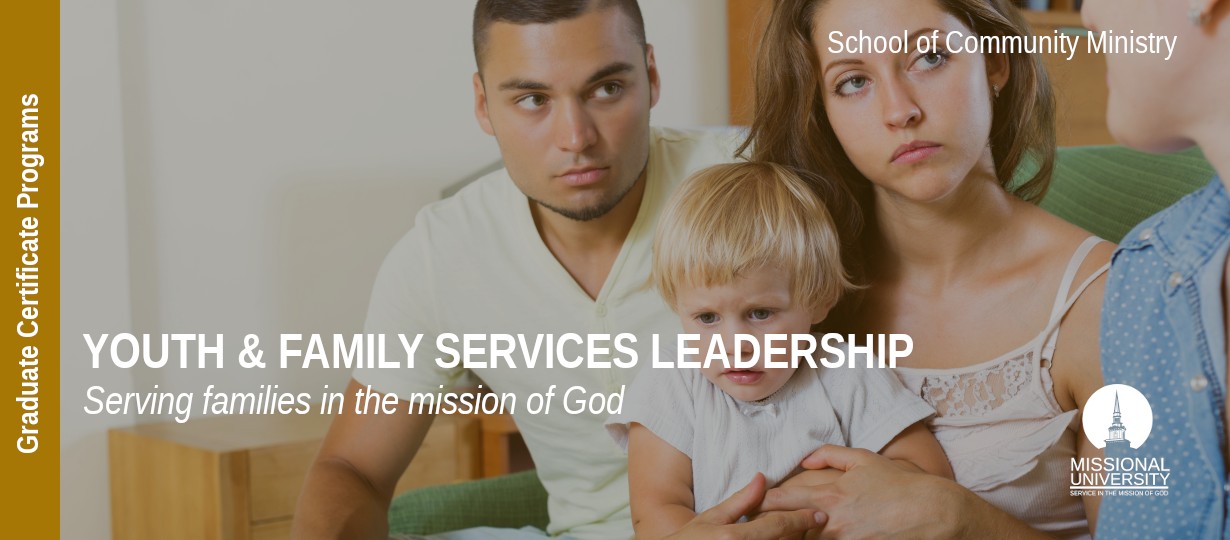
Online Graduate Certificate in
Youth & Family Services Leadership
⚜ Rarely Offered in Christian Universities, Bible Colleges or Seminaries
Expand Your Missional Service Today!
REQUEST INFORMATION
Ready to learn more about the
Graduate Certificate in
Youth & Family Services Leadership?
LEARN MORE NOW
The Graduate Certificate in Youth & Family Services Leadership offers community ministry practitioners, community ministry pastors, community ministry directors, community ministry missionaries, community ministry chaplains, community services educators, faith community services personnel, family life pastors, Christian social workers, youth pastors, youth workers, and those involved in serving children, youth persons and their families the following capabilities:
-
- ability to develop programs and services to families based on a Trinitarian theological foundation of family
- ability to utilize the biological, psychological, sociological, and spiritual aspects of human needs, strengths, and experience when engaging, assessing, planning, intervening and evaluating service delivery in the range of social systems in which individuals live: families, groups, organizations, and communities.
- ability to assess families based on an integrated understanding of individuals, couples, and families within their cultural context and family system
- abliity to address psychological, sociological and biosocial theories and perspectives related to stress and coping and determine the risk, protective and resiliency factors that facilitates recovery
- competency in the roles and skills of the human services professional who develops services to address the vulnerabilities and needs of children, youth, families and communities to minimize personal and societal strain
- competency in personal and relational skills when dealing with cultural diversity in the daily life and beliefs in families with young children
- competency in analyzing present day issues of risk in the lives of youth and at risk youth from a God centered perspective while using various frameworks to develop interventions appropriate to the risk issue
Youth and family services organizations develop and operate a broad continuum of treatment programs for children, adolescents and adults with behavioral health, emotional and physical challenges. Most of these are nonprofits or NGOs - some of which were started by churches, church groups or by Christian individuals. They create programs to develop healthy bodies, inquiring minds, wholesome relationships, compassionate hearts, creative spirits, the conviction to stand up for themselves and others, and the courage to build a better society. The Graduate Certificate in Youth & Family Services Leadership equips students to serve families by developing human services competencies that lead to the personal and relational skills necessary to analyze risk to children, adolescents and families and to plan intervention programs and treatments to relieve stress and facilitate recovery. Students are taught to approach their role from a God-centered prespective, joining the mission of God in the lives of those in the community.
Program Features
-
Integrated practicums allow you to gain valuable real-world experience
-
Learn from academic practitioners from around the world
-
Credits earned in this certificate program can apply to a Missional University Master's degree program
Course Effort
Course Length
Credits Required
Program Cost
What Will I Study?
We offer the most comprehensive approach to serving among vulnerable persons in the mission of God.
The rapid decline of marriage and family as a social institution calls for understanding the family biblically and theologically. This course provides a Trinitarian theological foundation of family. The course will focus on practical insights for missional relationships so that families may thrive as they are on God’s mission amidst today’s unrelenting worldly pressures.
An exploration of the theories and knowledge of human bio-psycho-social-spiritual-cultural development from birth through young adulthood in the context of the range of social systems in which individuals live: families, groups, organizations, and communities. In this course social workers will recognize that a holistic perspective requires taking into account the biological, psychological, sociological, and spiritual aspects of human needs, strengths, and experience. As well as the impact of social and economic forces on human development will be explored with special attention to evaluating theory and its application to issues of human diversity.
An integrated understanding of individuals, couples, and families within the cultural context. It will offer a study of the family as a system and the difficulties that families experience as they move through life and encounter people from different cultural backgrounds. The course will tackle misconceptions about different culture.
An examination of family stress and coping across the life cycle. Course will address psychological, sociological and biosocial theories and perspectives related to stress and coping. Topics are: parenting, poverty, work and family, violence, disability health/wellness, care-giving, normal/non-normal stress, and bereavement. Risk factors, protective and resiliency factors that facilities recovery will be addressed.
This course affords Missional students the opportunity to study the practices of the family, community and youth discipline. This course will present analytical concepts used in the study of the family, youth and community. Also in this course, emphasis is placed on the vulnerabilities and needs of children, youth, families and communities, and describes human services that maximizes human potential and minimizes personal and societal strain. The course introduces Missional students to the roles and skills of the human service professional.
In this course, Missional students will take a look at cultural diversity in the daily life and beliefs in families with young children. Various readings, discussions, videos, guest lectures, observations and reflective writing exercises will be utilized to assist future social science professionals in understanding and developing the personal and relational skills necessary to be active, transformative leaders. Missional students will learn key concepts, ethics, behaviors and competencies related to social work/social science professions and this course will also encourage Missional students to explore their own identity as a leader and professional in the social science field.
Missional Students through this course will analyze existing present day issues of risk in the lives of youth and at risk youth from a God center perspective. Missional Students will examine areas of practice using various frameworks to develop interventions appropriate to the risk issue. Missional students will demonstrate competence in real or simulated examples of risk situations using knowledge, skills, values and styles.
When Can I Get Started?
We offer multiple start dates each year to give you flexibility in your education, life and work schedules.
JANUARY
MARCH
MAY
AUGUST
OCTOBER
A Career in Transforming Communities
Is this Your Mission?
Afterschool Program Director, Case Manager, Case Manager/Family Consultant, Child and Family Specialist, Child and Family Services Caseworker, Children and Family Services Manager, Community Case Manager, Counseling Services Supervisor, Direct Care Counselor, Director for Child and Family Services, Director of Family Care, Director Of Family Education, Director of Family Programs, Director of Family Services, Assistant Director of Family Services, Education and Prevention Counselor, Family Advocate, Family and Community Advocate, Family & Community Engagement Manager, Family Care Manager, Family Consultant/Case Manager, Family Community Partnerships Coordinator, Family Engagement Advocate, Family Partnership Coordinator, Family Partnership Specialist, Family Search and Engagement Specialist, Family Services Caseworker, Family Services Case Manager, Family Services Coordinator, Family Services Manager, Family Services Navigator, Family Services Specialist, Family Services Supervisor, Family Services Targeted Case Manager, Family Services Worker, Family Support Manager, Family Support Specialist, Family Support Worker, Health and Family Services Manager, Homeless Family Engagement Specialist, Manager Family Services, Manager of Family Services, Parent, Family & Community Engagement Coordinator, Program Director-Child, Youth, and Family Services; Residential Counselor, Student Life Counselor, Supervisor of Child and Family Services, Youth Advocate, Youth and Community Engagement Coordinator, Youth and Family Counselor, Youth and Family Services Coordinator, Youth and Family Services Director, Youth and Family Services Manager, Youth and Family Services Staff Coordinator, Youth Care Team Leader, Youth Care Worker, Youth Counselor, Youth Development Navigator, Youth Development Specialist, Youth Development Team Leader, Youth Development Technician, Youth Development Ops Leader, Youth Night Counselor, Youth Prevention/Aftercare Coordinator, Youth Resident Instructor, Youth Treatment Specialist
Request Information Now
How Much Will it Cost?
We offer tuition based upon country of residence. According to the Human Development Index, all countries around the world fall into one of four categories:
-
(Tier 1) - Very High Human Development
-
(Tier 2) High Human Development
-
(Tier 3) Medium Human Development
-
(Tier 4) Low Human Development
Our tiered global tuition makes higher education affordable for everyone world wide.

TIER COUNTRIES
100% Tuition
$395
per credit hour
3 credit course
$1185

TIER COUNTRIES
80% Tuition
$316
per credit hour
3 credit course
$948

TIER COUNTRIES
60% Tuition
$237
per credit hour
3 credit course
$711

TIER COUNTRIES
40% Tuition
$158
per credit hour
3 credit course
$474
Tiered tuition based on country of origin and scholarships available. Find your country of residence here for more information.
Tuition may be further reduced by participating in the Sponsorship Program.
